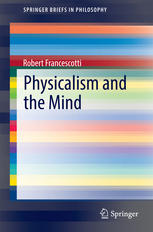

Most ebook files are in PDF format, so you can easily read them using various software such as Foxit Reader or directly on the Google Chrome browser.
Some ebook files are released by publishers in other formats such as .awz, .mobi, .epub, .fb2, etc. You may need to install specific software to read these formats on mobile/PC, such as Calibre.
Please read the tutorial at this link: https://ebookbell.com/faq
We offer FREE conversion to the popular formats you request; however, this may take some time. Therefore, right after payment, please email us, and we will try to provide the service as quickly as possible.
For some exceptional file formats or broken links (if any), please refrain from opening any disputes. Instead, email us first, and we will try to assist within a maximum of 6 hours.
EbookBell Team

4.1
40 reviewsThis book addresses a tightly knit cluster of questions in the philosophy of mind. There is the question: Are mental properties identical with physical properties? An affirmative answer would seem to secure the truth of physicalism regarding the mind, i.e., the belief that all mental phenomena obtain solely in virtue of physical phenomena. If the answer is negative, then the question arises: Can this solely in virtue of relation be understood as some kind of dependence short of identity? And answering this requires answering two further questions. Exactly what sort of dependence on the physical does physicalism require, and what is needed for a property or phenomenon to qualify as physical?
It is argued that multiple realizability still provides irresistible proof (especially with the possibility of immaterial realizers) that mental properties are not identical with any properties of physics, chemistry, or biology. After refuting various attempts to formulate nonreductive physicalism with the notion of realization, a new definition of physicalism is offered. This definition shows how it could be that the mental depends solely on the physical even if mental properties are not identical with those of the natural sciences. Yet, it is also argued that the sort of psychophysical dependence described is robust enough that if it were to obtain, then in a plausible and robust sense of ‘physical’, mental properties would still qualify as physical properties.